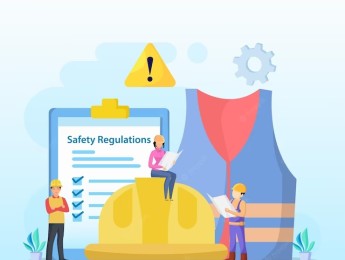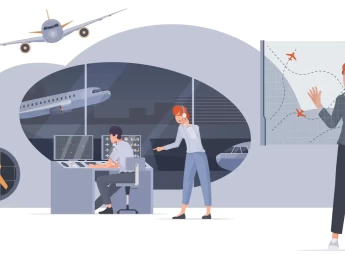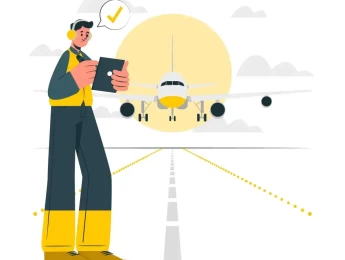Aviation is a vast industry that is essential to society. However, there is no denying there can be a great mental strain on those working within it. Certain roles, such as pilots and flight attendants, often require a significant sacrifice. Commitment to their employment often means they are regularly far from home and families, flying to and from unfamiliar places. Constant travel can make seeking traditional support systems much more difficult. Many aviation organisations have implemented a pilot & peer assistance programme to combat this.
A peer assistance programme is established to train existing pilots, flight attendants and other aviation staff on the basics of mental health, supportive communication and providing overall emotional support. Peers are responsible for offering struggling employees an empathic ear to listen to their struggles and provide comfort and encouraging words. They also can work together to overcome personal challenges and feel safer and more confident within their working environment.
Peers can also take on an emotional burden and must remain mentally positive. They will have to follow aviation regulations surrounding confidentiality and safety. However, as peer assistants, if they recognise potentially harmful behaviours within those they are helping, they have a duty of care to break confidentiality and inform the necessary parties of their concerns.
Upon completion of this course, participants will be able to:
- Understand the vitality of pilot and peer assistance procedures within an aviation organisation.
- Explore the roles and responsibilities of those responsible for pilot and pee assistance.
- Assess the consequences of poor pilot and peer assistance procedures and how they would affect individuals differently.
- Review the skills, attitudes, experience, and behaviours that would benefit a peer.
- Be conscious of openly discussing personal details and family life.
- Develop the ability to hold meaningful conversations with those who need peer aid.
- Analyse how pilot and peer assistance can lead to improved risk mitigation.
This course is designed for anyone within an aviation organisation who wishes to become a peer or existing peers who want to expand their knowledge. It would be most beneficial for:
- Peer Support Volunteers
- Pilots
- Flight Attendants
- Psychologists and Psychiatrists
- National Aviation Authority Personnel
- HSE Officers
- Mental Health Professionals
This course uses a variety of adult learning styles to aid full understanding and comprehension. Participants will review real-world case studies of peer assistance situations to highlight valuable skills presented, positive use of language and possible communication improvements.
The participants will participate in various presentations, group discussions, video materials, and group role-playing activities to guarantee a complete understanding of the taught content. This combination of methods, particularly the group-dependent techniques, will ensure the participants can absorb course knowledge and demonstrate practical skills. They can also offer and receive constructive feedback from others.
Day 5 of each course is reserved for a Q&A session, which may occur off-site. For 10-day courses, this also applies to day 10
Section 1: Introduction to Peer Assistance Procedures
- Defining what is meant by peer assistance within aviation.
- Understanding why peer assistance is often necessary within the industry.
- Reviewing the process of becoming a peer – necessary skills, communication standards and organisation regulations.
- A peer's typical role, responsibilities, functions, and associated risk factors within aviation.
Section 2: Understanding the Human Mind and Body
- Exploring why peer assistance is necessary for certain roles within aviation.
- Assessing how physical stressors can negatively impact the mind and body and how the body copes.
- Methods and techniques that can aid in lessening stress while at work and outside of working hours.
- How to recognise a deterioration of mental health and intervene when behaviours become concerning.
Section 3: Communication
- Utilising a calm and empathetic voice throughout all interactions.
- Identifying the ideal use of language, tone, and body language.
- Engaging in active listening even when the topics become heavy and overwhelming.
- Providing achievable solutions and discussing the ideal path to reaching these goals.
- Maintaining an open channel of communication.
Section 4: Regulatory Requirements of Peers
- Assessing regional laws and regulations surrounding peer assistance procedures.
- Ensuring all peers are fully trained and knowledgeable within the role.
- Comprehension of the CAA medical considerations within aviation medicine.
- Maintaining full individual-peer confidentiality and recognising some circumstances when breaking confidentiality is acceptable.
Section 5: Peer Assistance Process
- Evaluating the process of becoming a Peer within aviation.
- Examining various peer assistance models, their advantages, and disadvantages.
- Analysing what peer model is preferable in different situations.
- Mutual support peers for ‘difficult’ cases and understanding personal struggles faced while carrying out the role.
Upon successful completion of this training course, delegates will be awarded a Holistique Training Certificate of Completion. For those who attend and complete the online training course, a Holistique Training e-Certificate will be provided.
Holistique Training Certificates are accredited by the British Assessment Council (BAC) and The CPD Certification Service (CPD), and are certified under ISO 9001, ISO 21001, and ISO 29993 standards.
CPD credits for this course are granted by our Certificates and will be reflected on the Holistique Training Certificate of Completion. In accordance with the standards of The CPD Certification Service, one CPD credit is awarded per hour of course attendance. A maximum of 50 CPD credits can be claimed for any single course we currently offer.
- Course Code IND18-105
- Course Format Classroom, Online,
- Duration 5 days












